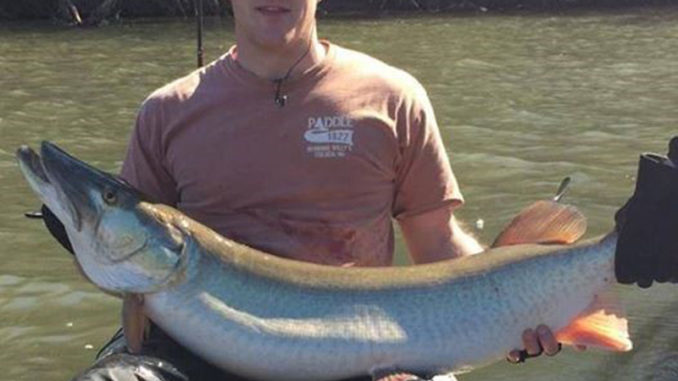
North Carolina angler releases huge fish that’s easily a new state record
When Cody Gilliland tossed his half-ounce football jig with a grub trailer toward a pile of submerged timber along the bank of the Broad River on Feb. 8, he was hoping to catch a hefty largemouth. He got a “largemouth” all right — it just happened to be a member of the pike family, a huge muskellunge.
Gilliland, of Bessemer City, N.C., and a fishing buddy, David Golding of Gastonia, N.C., were in the middle of an 8-mile kayak trip on the Broad River near Gaffney when Gilliland got a fateful bite.
“I was fishing real slow,” Gilliland said. “I threw right up on the bank, under some logs, and it was on.
“It felt like a small fish, but when I set the hook, I knew I had something big. It had the rod tip bent double in the water and pulled me into the center of the river. I thought I had a record largemouth.”
What he had was a record-size muskellunge, aka muskie. He just didn’t know it.
“He finally floated up, and we saw him, and David said it looked like a muskie,” Gilliland said. “I didn’t even know they existed in that river.”
The only thing that Gilliland knew was that he was suddenly immersed in one heck of a tug-of-war. A float boat with two anglers from Tennessee pulled up to watch the battle unfold and offer assistance.
“Four or five times in the next 15 minutes, he’d come close to the kayak, then he’d run,” Gilliland said. “He came completely out of the water one time. All I had was 15-pound (line), so I was nervous the whole time. I was fortunate to get him in.”
When Gilliland, a 26-year-old deputy with the Mecklenburg County Sheriff’s Office, finally got the big muskie in hand, it weighed 32 pounds, 4 ounces on a set of hand scales— with a portion of the fish’s tail still in the water.
After snapping several photographs, they slipped the fish back into the river.
The monstrous muskie easily would have shattered the state record for the species, which remains a 22-pound, 8-ounce fish caught by Gaffney’s Zavier Jefferies in 2004. Gilliland would have had to have the fish weighed on certified scales for it to qualify as a record catch.
“We never thought about the possibility that it could be a new record,” Gilliland said. “When we got back and started reading about it, David said, ‘You’re not going to believe this, but you would’ve had a record right now.’ ”
But Gilliland seems perfectly content to have a photo trophy of his memorable catch.
“A fish like that, he’s been alive for so long, maybe that was just meant to be — I just took it to mean that he belongs in that water,” Gilliland said.
Gilliland has been fishing “since I could walk,” he said, and he often joins his uncle for fishing trips at Lake Wylie. He also enjoys catching smallmouth bass at Lake Jocassee, trout in North Carolina’s mountains and bowfishing for gar.
“But here lately I’ve been doing a lot of kayak fishing,” said Gilliland, who a year ago joined a group known as the Hardcore Kayak Fishing Team.
So will he float-fish the Broad River again soon?
“Well, I want to go back and fish again when the smallmouth are biting better,” he said.
But he’ll never forget his first trip.
“Hands down, this was the highlight of my fishing career,” Gilliland said. “I’m just in awe of it. I never thought a fish that big would have been in water like that. Maybe he’ll die of old age before he’s caught again.”
Muskies aren’t native to South Carolina waters; they apparently migrated into the river and moved downstream after being stocked in Lake Adger in Polk County, N.C., in the 1970s.
“We occasionally get a trickle-down fish that has grown out,” said Dan Rankin, a fisheries biologist for the South Carolina Department of Natural Resources based in Clemson. “We heard about more of them in the 1990s, but obviously, there are still some fish in there.”

Be the first to comment